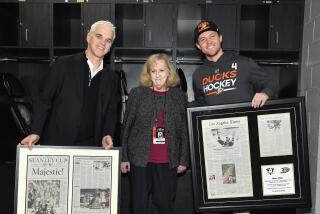The Demise of Typewriters
- Share via
* Bravo to Alvin Shuster (“Ode to the Typewriter,” Commentary, July 7) for helping so many of us relive those early days of pounding the keys, sometimes with only two fingers, while chewing a cigar or having a cigarette dangle from one’s lips as you thought you were writing the greatest news story of the day!
And yes, many of us still have our old Royals, IBM electrics and Olivettis sitting nearby “just in case,” or in some storage area, gathering dust but keeping cherished memories alive, while we quietly create prose and/or poetry. And for some in this town, where almost every garage, den or basement is used as a writing room, we sit at our typewriters and/or computers creating a script that we all think is going to “make it big” in Hollywood.
Yes, I was one of the fortunate ones to have worked in New York and Washington so many years ago when Shuster was there as well, when some of the great reporters and writers of the day (yes, there is indeed a difference between reporting and writing) worked only with typewriters, banging away, chomping at a cigar, or smoking a cigarette, and, when the story was done, screaming: “Copy!!” And when it was deadline time, it was one page at a time, rather than waiting for the story.
His column captured the mood of an important period in American journalism, as well as the importance of typewriters.
LLOYD B. DENNIS
Redondo Beach
* Those of us who are old enough can appreciate Shuster’s encomium to the lowly typewriter, now on the verge of obsolescence. We, too, have a closet inhabited by Smith-Corona, Olivetti and Adler dinosaurs.
For many years now I have written on my miraculous Mac and can add, delete and move one word or an entire section of text in seconds. When I do this, I recall the torture and tedium of typing college papers.
In my business, I can send the same letter to innumerable people and need to change only the heading and a few specific references in the text. Again, a matter of seconds to accomplish. In Olivetti days I would have had to type an original letter for each recipient, an untenable thought.
As I see it, the major loss as a result of the transition from typewriter to PC is that in future years we no longer will be able to go to a place like the Huntington Library or the New York Public Library to see exhibits of contemporary and future authors’ original texts. Now we can look at Twain’s or Joyce’s or Dickinson’s manuscripts and see the evolution of their thinking as they crossed out and substituted one word or phrase for another. Fortunately, these examples will always be with us.
JUDITH R. BIRNBERG
Sherman Oaks
More to Read
Only good movies
Get the Indie Focus newsletter, Mark Olsen's weekly guide to the world of cinema.
You may occasionally receive promotional content from the Los Angeles Times.









